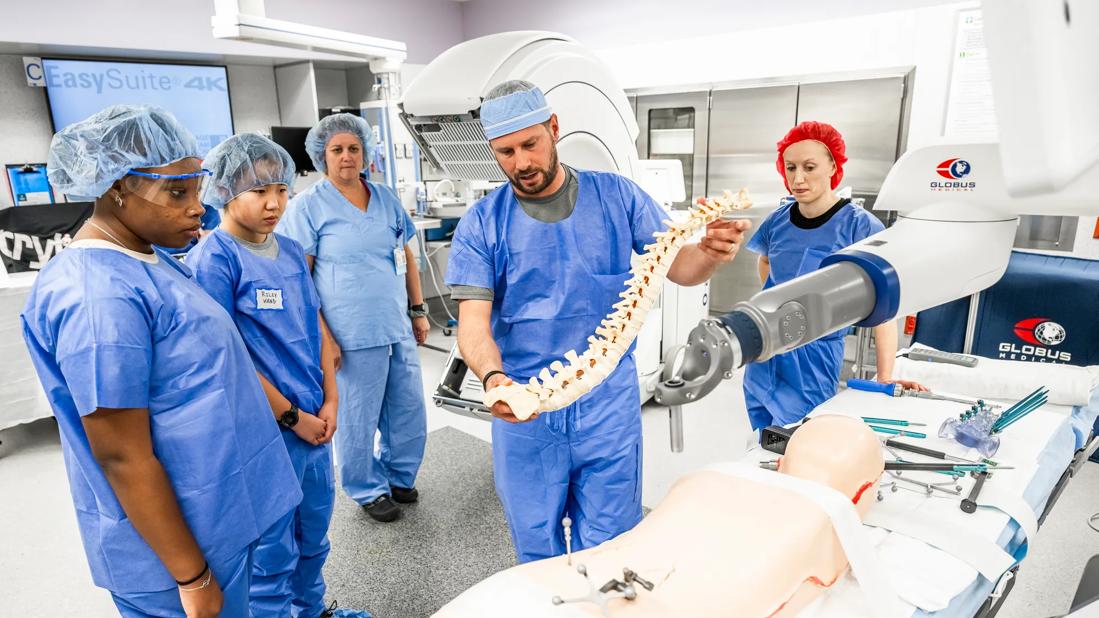New ambassador program provides resources for nurses serving as clinical instructors

More than 300 registered nurses at Cleveland Clinic serve as adjunct faculty for 18 universities across eastern Ohio, working with nursing students in clinical rotations, providing hands-on training and enhancing classroom education. These adjunct faculty members, called ambassadors at Cleveland Clinic, are vital to training the next generation of nurses.
Advertisement
Cleveland Clinic is a non-profit academic medical center. Advertising on our site helps support our mission. We do not endorse non-Cleveland Clinic products or services. Policy
In July 2021, Cleveland Clinic Health System launched its Ambassador Program to support adjunct faculty and provide rewarding clinical experiences for students.
“Healthcare is ever changing, and when combined with increasingly complex, higher-acuity patients and advanced technology, it can be challenging to ensure students have meaningful clinical and practicum experiences that accomplish academic program outcomes,” says Kathleen Mau, DNP, APRN, NEA-BC, ACCNS-AG, ACNS-BC, CEN, Senior Director of Nursing Education and Professional Development. “Cleveland Clinic recognizes these challenges and wants to support our nurses serving as clinical faculty with information, education, resources, tools and connections.”
Strengthening recruitment efforts is an important aim of the program. Leaders set a goal to double the number of students in clinical rotations at Cleveland Clinic facilities annually to more than 850. They aim to increase the hiring conversion rate of those students to 75%.
“It is important that students have a great clinical experience and are exposed to the many opportunities available to them as Cleveland Clinic nurses so they want to return after they graduate,” says Dr. Mau. “Our ambassadors are in the best position to highlight these opportunities.”
A daylong kickoff conference, called the Clinical Faculty Academy, was organized by Cleveland Clinic in conjunction with deans and program coordinators from nursing schools. Attendees included adjunct faculty from partner schools as well as Cleveland Clinic nurses interested in becoming ambassadors.
Advertisement
The event began with video messages from nursing leaders, including Meredith A. Foxx, MSN, MBA, APRN, NEA-BC, PCNS-BC, PPCNP-BC, CPON, Executive Chief Nursing Officer. Two members of Cleveland Clinic’s talent acquisition team shared the impact that clinical faculty make on recruitment efforts. Tonya Moyse, MSN, RN, Nurse Manager on the Orthopaedic Surgery Unit, spoke about the importance of developing a strong relationship with nurse managers, and Dr. Mau discussed resources available to support adjunct faculty.
An in-person morning session focused on the nuts and bolts of the clinical faculty role: how to organize the clinical day for students, how to give and receive feedback and how to partner with nurse managers to create a culture of safety and success. Afternoon sessions addressed how to create a positive learning environment, deal with difficult students, evaluate clinical competencies and more.
A dedicated resource page on Cleveland Clinic’s nursing education intranet site features a recording of the kickoff event, a presentation on the requirements and benefits of becoming an adjunct faculty member, and documents with questions to prompt conversations between faculty and unit nurse managers during rounds.
The program also rolled out Catch Us at Our Best cards for nursing students who have exceeded expectations in providing patient care. Caregivers or patients complete the cards with the student’s name and reason for the recognition, and then drop them off at the unit nurse manager’s office.
Advertisement
Recipients of Catch Us at Our Best cards are acknowledged at daily huddles. “Sometimes students go to clinicals, go home, and may or may not feel valued,” says Christine Szweda, MSN, RN, Senior Director of Students and Faculty. “The recognition program is a simple way for unit nurses to take a moment and recognize when a student does something positive.”
The cards also provide a repository of top-notch students Cleveland Clinic may contact toward the end of their nursing program about potential employment.
As the Ambassador Program grows, nursing leaders hope the number of adjunct faculty, practicum students and new graduate RN hires will, too. “It’s rewarding for our ambassadors to serve as instructors on their units, show students what a great place this is to work and share the awesome culture here,” says Moyse. “We want to fully support them and our students.”
Advertisement
Advertisement

Planning continues with critical, patient-focused input from nursing teams

Strengthening care through targeted resources and frontline voices

Embracing generational differences to create strong nursing teams

CRNA careers offer challenge and reward

An unexpected health scare provides a potent reminder of what patients need most from their caregivers

Cleveland Clinic Abu Dhabi initiative reduces ICU admissions and strengthens caregiver collaboration

Veteran nurse blends compassion, cutting-edge transplant training and military tradition to elevate patient care

Embrace coaching and other tips to be a stronger leader